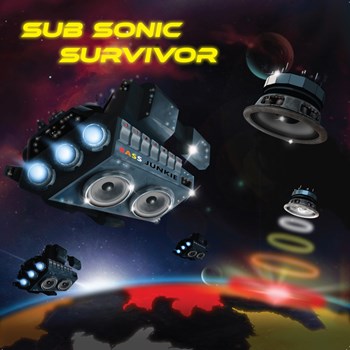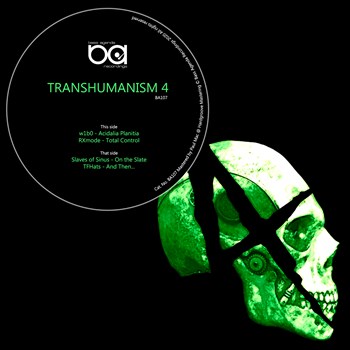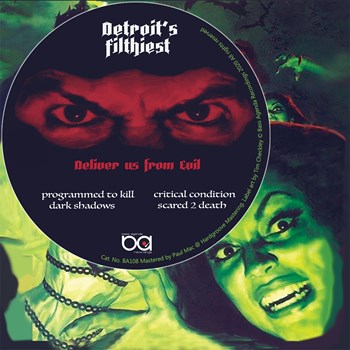Electro Masterplan - An interview with Andy Barton from Bass Agenda
Wednesday, December 16, 2020
by Tat
Andy Barton has been one of Techno and Electro’s hardest working men in the past decade. As both scenes have flourished he has beavered away in the background running his Bass Agenda imprint and popular radio show on Juan Atkins’ Deep Space Radio. We were lucky to catch up with Andy in what has been a watershed period for the label with the monumental CAREBOT$ release that not only brought together over 100 artists from the electronic music scene but also raised valuable funds for NHS and Médecins Sans Frontières.
It’s been a much quieter year for the label across the year compared to 2019, has that been a conscious decision or impacted by the pandemic?
For the most part that has been on purpose. Bass Agenda and Bass Agenda Recordings are run by me on my own. Between 2013 and 2019 the label had done over 100 releases and I had made the decision to take a year off to take stock, recover some energy, and decide what phase two would look like. As always, a few projects overran into 2020 and because of the COVID impact on vinyl production a couple are even slipping into 2021 now. I have not taken on a new project for months, apart from the CAREBOT$ release. Pretty much all you have seen this year and will see in the first quarter of 2021 is stuff that’s been in the pipeline for almost a year.

One of the big releases in the electronic music scene was your epic CAREBOT$ release which was a mammoth effort to help raise money for the NHS and Médecins Sans Frontières. How did that come about and what was the reaction like for such a great initiative?
As things with COVID started to escalate to the point where it was obvious this was a huge global event, and in the UK where I am based in particular, I think lots of us felt the urge to do something. For most people, me included, it was hard to know what we could do that would have any impact. Standing on doorsteps clapping for carers and all that was a nice gesture, but it felt shallow, and did not have any lasting benefit in a lot of ways. I briefly entertained the idea of doing a compilation but pretty much talked myself out of it, telling myself “you’re supposed to be taking a break”. Around the same time I was grappling with the idea a couple of people had made noises about doing something. It was Dez Williams who tipped me over the edge when he messaged me to say “there's a few labels doing stuff for their artists now, and thought perhaps as Bass Agenda has such a good following we could also do something and put the money towards the NHS or something that could be of help? Even if it's towards food for staff or something”. That same day I started asking a few people if they would be interested and it snowballed from there. As far as the reaction goes it has been crazy, definitely beyond expectations. I remember saying to the woman I was dating at the time “I’ll be chuffed if we can raise two grand.” As things stand, we’ve raised over £8,500! A really big thing to come out of it is the number of artists who have since said how the project helped them personally deal with the pandemic; giving them something positive to focus on. In addition to being able to see fruits of their labour, and connecting with other artists and music fans they didn’t know beforehand. That sense of community has had me choked several times this year, it really seems to me that this is what we humans should be doing with our time and energy; be creative, bring people together, and help people – especially these days (he says hit stop before he gets political….)
The compilation is 142 tracks with some very notable contributions by the likes of Radioactive Man, John Selway, Carl Finlow and Plant 43 to name but a few. Were you surprised by how many artists got behind this release?
That first day I started contacting people. I just approached some of the more well-known names in the scene and also those who do other things such as podcasts, radio and gigs etc. I forget how many I invited in total. I know only four didn’t respond and that by the end of the third day, when I announced it on Facebook, there were around 75 people on board! I had worked with Martin Boulton from Touched on a compilation to raise money for Macmillan Cancer Support back in 2016 and that had over 135 artists on it. So I knew it was possible for these things to grow and people really got behind it, either by buying it, writing about it, playing it on their radio shows and so on.
How much work was it to bring the release together, did you plan on it being such a comprehensive collection?
I think because the guests I have on the Bass Agenda show are quite varied there is a real range of people that have come to know me, and so the range of styles on the release kind of reflects that I guess. I remember having conversations with some people and they were hesitant about sending tracks because they were worried they weren’t making the obvious 135bpm Electro bangers. My attitude was that this is a caring human project, there’s no place for genre snobbery, not having a high profile and all that crap. COVID doesn’t care whether you’re in DJ Mag’s ‘Top 100 DJs’ or not. When you have over 100 tracks on something like this I think it is important to have diversity, it would be boring otherwise. I was more than happy to see it include a range of electronic sounds. I would not necessarily say I planned it that way, but by nature of the people who know me and how I look at music it happened that way anyway!

Your first release in 2013 was a compilation titled: “The Fight Against the Mundane”. How does electronic music ensure that it remains relevant, progressive and challenging?
That is THE question isn’t it!! It is tricky too, because Electro in particular is extremely loyal to its roots – Kraftwerk, Hip Hop, Drexciya etc. That is really important but also a limiting factor sometimes. I have people send me demos saying ‘I’ve made an EP and it sounds just like Dopplereffekt’ and my first response is ‘why’? That’s not to say they shouldn’t do it – some people do it incredibly well. But if we’re talking about progress then there needs to be more than that. I think people who listen to multiple genres tend to come up with the more interesting stuff because they are not limiting themselves to one narrow slice of the sound spectrum. A lot of time it’s about attitude though I think. One of my favourite artists, and people for that matter, is Detroit’s Filthiest. Every time we talk on the phone he’s telling me how he’s trying to beat what he did with his last release, how he’s trying what seems like ridiculous combinations of sounds and styles to see what comes out, how he’s avoiding listening to other artists so he doesn’t get influenced – and I love that. I’ve looked at comments in Dave Clarke’s YouTube chat stream when TFHat’s ‘And then..’ has been playing and I love seeing what people are saying ‘Is it ADULT.? No sounds like Front 242? No but it’s too melodic’, ‘are the vocals a sample?’. I love that people are stimulated like that – it shows that something interesting is going on at both sides of the experience. Why do something you’ve already done 100 times before?
Having said that though, many of the Electro genre’s biggest names make music that is close to the records they became known for, and sales suggest people are cool with that. There is perhaps nothing wrong with doing something similar each time if you are at a high standard. You ask about challenging though, and I think that is what’s really interesting. Labels generally are cautious about money, when it comes to vinyl in particular – so being challenging is risky. I really like what DJ Di’jital said recently actually – “I’m looking forward to being more experimental…being accepted by the music industry is the wrong reason to do it. I look forward to being more fearless in recording.” This is an artist who has been in the game for 25+ years and is challenging himself. Like most things in life it's about having an open mind.

The fourth Transhumanism EP drops this month with four Dutch producers contributing to the record. What is the idea behind the series?
The series was sparked off by Dave Clarke’s first Whip It party in Amsterdam in early 2016. I had already released music by the four artists - w1b0, TFHats, Slaves of Sinus, and RXmode but we had never met in person. We arranged to meet at that party and had a real blast and during the night got talking about how cool it would be to get everyone all on one release. It was born out of friendship really. It's four artists plus one label owner who can all trace their passion for this music to Dave Clarke’s radio and DJing over the years. That event and meeting was the perfect place to spark the project.
The series has been supported massively by Dave Clarke, Juan Atkins, UMEK, Helena Hauff and so many great DJs so it has been a real thrill to see a basically drunken pipe dream come to life. Creatively it works because the four guys each have their own sounds, each record brings great Electro from four different angles. The 4th EP has been well received already, the TFHats track ‘And Then..’ in particular seems to be hitting the mark.
You host a very popular radio show on Deep Space Radio which is about to reach episode 200. It’s clearly a real labour of love, how much effort goes into the series and how do you select guests?
It is a labour of love, you’re 100% right there. I probably put the equivalent of full-time working hours into it for a couple of weeks each month. It began as a weekly thing in 2012 and has been monthly for a good while now, so the second 100 has been slower. It feels like a major milestone to me. Being invited to join the roster on Deep Space Radio was mind blowing. I still suffer from imposters syndrome to be honest. Juan Atkins and Jason Staten and a few others started the station in 2014 and most of my favourite episodes have been ones where I have interviewed Detroit artists, so it feels like the stars have aligned! Guest wise I like to mix it up. I like the idea of getting a big name like Juan Atkins or Anthony Rother in one week and then a lesser known artist in the next. It represents the truth of the scene – it is diverse, there are people at all different stages in their creative development, everyone counts, and it will only survive if all generations are given a chance to be heard. I like guests to have a few releases behind them usually, so there is something solid to talk about. Sometimes I approach people because I like their music but have never seen them interviewed or anything. Other times people approach me and if it feels right we do it. I need to feel excited about the guest and their music to be able to invest so much time in an episode. I’m definitely driven by the idea of building this archive of diverse guests telling their stories alongside their music. One of the biggest compliments I have ever had came from a painter in London called Tim Stoner. He described the Detroit episodes as being ‘Important cultural artefacts.’ That has really stuck with me – because this culture and this music is important on so many levels and I feel honoured people recognise that’s where Bass Agenda’s heart is.
From working with producers and DJs on the radio show and compilation how would you assess the state of Electro and Techno in what has been a rather turbulent year?
I think this year has hit people differently depending on where they are with their career. I spoke with people who had tours arranged to support album releases in Spring who were devastated at having everything cancelled. They saw the money they had spent on production etc slip away. The tours were supposed to recoup those costs and provide income for the year in some cases. I think most countries – especially the UK have been terrible at recognising this. Governments generally have such an ill informed and narrow view of what is art and who is an artist. Funny how everyone turns to art and media to relieve tension in times like this, yet so few people actually value it or stick up for it when the shit hits the fan. For others who don’t tour and produce at that level it hasn’t been a financial hit in the same way of course. I know several people who have found getting demos heard even more difficult because label owners are preoccupied, understandably. That said the downtime has got a lot of people at all levels really putting the time into the studio so I think we’ll be seeing a steady stream of great stuff coming out in the coming months. DJing wise we’ve seen the shallow and ugly side of things like big name EDM DJs begging for money when they don’t need it – but that’s just the mainstream capitalist mutilation of Techno showing its true colours as it has done many times before. The whole plague raves thing is just bizarre and extends from the same thing I guess. There have been some great streaming events going on though, and I think people like The Advent and his techno-club.net concept shows we can evolve and find a win-win solution whilst things get back to normal.

What are your plans for the radio show and label going forward in 2021?
Label wise I have three vinyl and one digital release coming up. Transhumanism 4 drops on 12th of December. The next EP from Detroit’s Filthiest is due 29th January and then the Sub Sonic Survivor LP by Bass Junkie will follow. The digital release is a follow up EP to Distorted Drill and Phasz’s 2019 release Electrica Savana. I’m really excited about that too. Those guys are doing something really interesting and off the main path in Electro. Once those are done I’m taking a break. I’m not sure what phase 2 of the label will look like. I’ve had some interesting conversations with someone in Detroit and might look at doing something geared towards that sound and artists. Nothing solid planned out yet though.
Show wise, I’ll keep going of course. Episode 200 is on the 8th January and I’m really excited about the line-up - Dave Clarke, Alienata, and Radioactive Man. I have a couple of guests in the queue for February and March and knowing how this goes I’ll have a longer list before too long. I’ve been toying with the idea of something like Patreon or something to raise a little money to pay the cost of running the show and maintaining the archive, but again I’ve no solid plans as yet. I really want to carry on working with the guys at Deep Space Radio to develop the station further – we are looking for sponsors etc in 2021 for instance.
We are always interested in our interviewees finding new music these days. Outside of promos you receive at the label, how do you discover new music?
My show is a huge source of discovery for me as much as it is for listeners. Part of the reason I started the show was to learn and discover more of the music I liked. Guests regularly choose music I have never heard of and that blows me away. I like lots of different types of music. I try to listen to Dave Clarke’s Whitenoise and his new Saga series regularly. And then there’s YouTube channels. I really enjoy Jamel_AKA_Jamal’s reaction videos channel for example – lots of great classic rock and metal stuff, disco, soul, blues, and all sorts on there, and I love his passion. One of my neighbours has introduced me to classical recently and dropped a USB stick in today with a few operas to check out. I am open to anything really. Having the time is another thing of course!
https://bassagendarecordings.bandcamp.com/
https://www.bassagenda.co.uk/
Discover new digital dance music with Trackhunter








